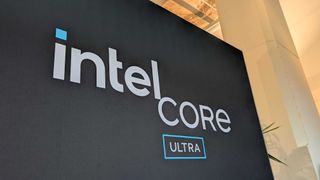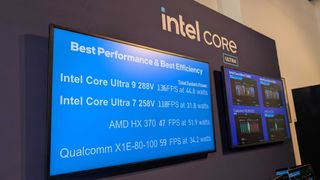Intel Core Ultra Series 2 is official, delivering massive performance, efficiency, and AI gains in thin and light devices
Intel's latest mobile processors promise to set new benchmarks for premium Windows laptops.


What you need to know
- Intel Core Ultra Series 2 is the second generation of a new era of mobile Intel x86 processors, falling under the 200V-series moniker.
- Lauded as the "most efficient family of x86 processors ever" by Intel, Core Ultra Series 2 promises "breakthrough" power efficiency and a "massive leap in graphics performance."
- Alongside improved performance, power efficiency, and AI capabilities, Intel highlighted the application compatibility of its new chips, clearly referring to the emulation limitations of Qualcomm's Snapdragon X series of ARM SoCs.
- Many OEMs have PCs powered by Intel Core Ultra Series 2 on the way starting on Sept. 24, 2024, and PCs powered by these chips will be able to update to Copilot+ PCs in November.
We knew it was coming. In fact, we already knew a fair deal about it from Intel's teasing earlier this year. Set to represent a massive leap for the company, we finally have all the details on Intel's "Lunar Lake" mobile x86 processors, which are arriving soon in brand-new premium Windows laptops with enhanced performance, refined efficiency, and upgraded AI capabilities. Intel is openly challenging AMD and (especially) Qualcomm with these chips, but is Lunar Lake up to the task?
Intel has already announced nine SKUs built on the new Lunar Lake platform, and each chipset shares the same foundation: 8 cores, a new generation of mobile integrated graphics, and an ultra-powerful NPU that will make all these devices Copilot+ PCs come November. There's a lot to cover here, though, so let's dive right into why Intel Core Ultra Series 2 is a big deal for Windows laptops.
🎒The best Back to School deals📝
- 🕹️Xbox Game Pass Ultimate (3-months) | $29.99 at CDKeys (Save $20!)
- 🎮Lenovo Legion Go (Z1 Extreme) | $599.99 at Best Buy (Save $100!)
- 🎧Sony WH1000XM5 ANC Headphones | $329.99 at Best Buy (Save $70!)
- 🕹️Starfield Premium Upgrade (Xbox & PC) | $27.69 at CDKeys (Save $7!)
- 📺LG UltraGear OLED Curved Monitor 39 | $999.99 at Amazon (Save $500!)
- 💻HP Victus 15.6 Laptop (RTX 4050) | $599 at Walmart (Save $380!)
- 🕹️God of War: Ragnarök (PC, Steam) | $50.19 at CDKeys (Save $10!)
- 💻Lenovo ThinkPad X1 Carbon | $1,481.48 at Lenovo (Save $1,368!)
- 🎮 Seagate Xbox Series X|S Card (2TB) | $229.99 at Best Buy (Save $130!)
- 🕹️Hi-Fi RUSH (PC, Steam) | $8.99 at CDKeys (Save $21!)
- 🖱️Razer Basilisk V3 Wired Mouse | $46.99 at Best Buy (Save $23!)
- 🖥️Lenovo ThinkStation P3 (Core i5 vPro) | $879.00 at Lenovo (Save $880!)
Improved performance and efficiency

The two most fundamental elements of any processor are performance and efficiency, and Intel strived to massively advance both with Intel Core Ultra Series 2. Of course, that's almost always the goal with any new chipset generation, but the way Intel went about accomplishing this makes the 200V-series very different from basically anything the company has done before.
That's because Intel rearchitected its high-performance P-cores while also makes its efficiency-driven E-cores more powerful than ever, leading to a dramatic increase in both performance and comparatively dramatic decrease in power draw when compared to the first generation of Core Ultra CPUs. Despite all Core Ultra Series 2 SKUs boasting a maximum of 8 cores, a huge step down from the 16-core and 22-thread max of the Intel Core Ultra 9 185H, these processors are on average more performant and consume less power.
In Intel's testing, the company reports an up to 3x increase in performance per thread and up to an 80% performance uplift. With a 23W power draw, the 8-thread Ultra Series 2 only lost 6% performance in multi-threaded tasks versus the 22-thread gen-1 Core Ultra, and this helps Intel make significant advancements in power efficiency. Intel quotes up to 20-hours of battery life with the 200V-series, although obviously real-world figures are likely to vary, and with these chips capping out at a 37W Thermal Design Power (TDP) when turbo boosting, I expect to see impressive endurance.
What matters most here is that Intel's new approach to Systems-on-Chip (SoCs) means that Intel Core Ultra Series 2 goes toe-to-toe with Qualcomm's impressive Snapdragon X series of ARM-based SoCs and AMD's new Ryzen AI 300 mobile chips in both performance and efficiency, often coming out on top in performance-per-watt, depending on the test. It's not just the efficiency and power of individual cores, either — Intel has refined every element of the 200V-series, including superior power management and power delivery, improved on-board memory and cache, and more.
A new generation of mobile integrated graphics

In addition to an improved CPU structure, Intel Core Ultra Series 2 also boast the first appearance of Intel's Xe2 "Battlemage" graphics microarchitecture, which promises a 30% average performance increase when handling graphical tasks, according to Intel. The 200V-series will all feature Intel Arc graphics with greatly improved power efficiency and AI capabilities, but Intel also quotes some specific gaming improvements, as well.
Get the Windows Central Newsletter
All the latest news, reviews, and guides for Windows and Xbox diehards.
At the core, Xe2 consists of eight Xe2 graphics cores, eight ray tracing cores, and a host of other upgrades like support for eDisplayPort 1.5, display output support for up to three 4K monitors, and more efficient support for various 4K video codecs. Xe2 also contributes to Intel Core Ultra Series 2's superior AI capabilities with up to 67 Tera Operations per Second (TOPS), but all these chips also feature a more capable Neural Processing Unit (NPU) to handle on-device AI tasks, and can assist with advancements to Intel's AI-powered XeSS upscaling technology.
Largely, Intel has focused on shoring up the performance bottlenecks it discovered with the first generation of integrated Intel Arc graphics to ensure that the 200V-series of chips are more capable when rendering, outputting high-resolution video, playing games, performing AI tasks, and simulating ray tracing. Performance has seen a notable increase across the board, but efficiency is also significantly improved. One example includes the Xe2 Arc graphics consuming 2.5W of power when utilizing 4K video hardware decoding versus the 24W draw of last generation.
This means that Windows devices powered by Intel Core Ultra Series 2 should be far more capable for casual gaming and creative work without generating more heat or requiring thicker, heavier designs. We also know that Intel is wanting to be more competitive with AMD when it comes to mobile gaming, as MSI is preparing its Claw 8 AI+ gaming handheld powered by Intel Lunar Lake and the new Xe2 graphics. The new Xe2 GPUs also have full support for Microsoft's DirectX 12 Ultimate gaming suite.
Top of the charts TOPS for AI tasks

The first generation of Intel Core Ultra CPUs was among the first to feature integrated NPUs for handling AI tasks, but none could hold a candle to the AI prowess of Qualcomm's Snapdragon X series of devices, which are the first true AI PCs we've seen. AMD has already shown its answer, and now we have Intel's. The 200V-series of chips feature a massively upgraded NPU with up to 4 times the performance.
Intel claims a combined platform performance of 120 TOPS for Intel Core Ultra Series 2, but that does include the CPU, GPU, and NPU. When it comes to becoming a Copilot+ PC and supporting on-device AI features like Copilot, Cocreator, and (eventually) Recall, it's the NPU that is most important. Having a capable NPU means leaving the CPU and GPU open to handle other tasks, and Core Ultra Series 2 has it all. This time around, the 200V-series boasts an NPU with up to 48 TOPS of power, meaning new PCs powered by the chips will be upgraded to Copilot+ PCs later this year.
NPUs still aren't particularly useful this early in the AI revolution, but as time goes on they'll be used more and more without compromising performance elsewhere. Intel Core Ultra Series 2 is about future-proofing, setting up new devices to remain competitive for years. Now that Qualcomm, Intel, and AMD are more or less on even footing here, it'll be interesting to see how AI in Windows continues to evolve.
A whole range of improvements coming this month

Intel Core Ultra Series 2 is looking to be a very impressive step forward for Intel, delivering upgrades in every category. We also don't have to wait long to get our hands on the new generation of chips, as the 200V-series is coming to consumers as early as Sept. 24, 2024 alongside the first wave of new Windows laptops from Dell, Lenovo, HP, Acer, ASUS, and more. In fact, we already know about a few, like the brand-new Dell XPS 13 and the HP OmniBook Ultra Flip 14.
There are actually nine SKUs of Intel Core Ultra Series 2, for some reason, with four Core Ultra 5s, four Core Ultra 7s, and one Core Ultra 9. All share the same core count and underlying technology, including full support for up to three Thunderbolt 4 ports, Wi-Fi 7, Bluetooth 5.4, on-chip LPDDR5X RAM, and a maximum turbo power of 37W. No, there's no Thunderbolt 5 support this time around, for some reason, but it's still very early days for that tech.
The SKUs mostly differ in clocking and turbo frequencies, GPU voltage, RAM amounts, and the base CPU power (with all SKUs being 17W and the Core Ultra 9 being 30W). Of course, I also expect the SKUs to vary wildly in pricing. The majority of PCs powered by Intel Core Ultra Series 2 will also fall under the new Intel Evo standard, offering guarantees on cool and quiet performance, responsiveness and instant wake, lasting real-world battery life, hardware security features, future-proofed connectivity, and high sustainability standards.
I'm personally really excited to see how Intel Core Ultra Series 2 fares in the real world once we get our hands on new Windows PCs. Things are continuing to get increasingly interesting in this category as Intel, AMD, and Qualcomm all compete to be the very best. Right now, the race seems too close to call.





Zachary Boddy (They / Them) is a Staff Writer for Windows Central, primarily focused on covering the latest news in tech and gaming, the best Xbox and PC games, and the most interesting Windows and Xbox hardware. They have been gaming and writing for most of their life starting with the original Xbox, and started out as a freelancer for Windows Central and its sister sites in 2019. Now a full-fledged Staff Writer, Zachary has expanded from only writing about all things Minecraft to covering practically everything on which Windows Central is an expert, especially when it comes to Microsoft. You can find Zachary on Twitter @BoddyZachary.
- Sean EndicottNews Writer and apps editor